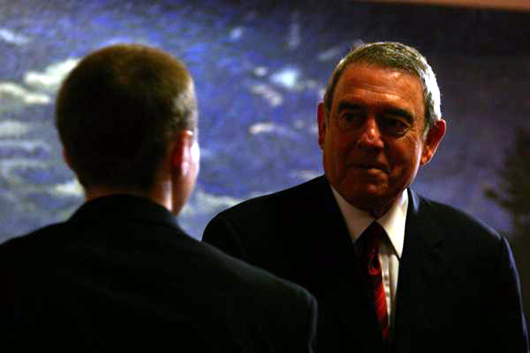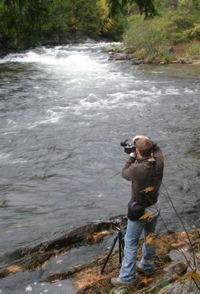
Being a low-level celebrity and meeting high-level celebrities such as Dan Rather (too bad he's a shabby reporter) is a cool part about being a journalist. These moments make journalism a difficult career to abandon. (Photo by Stacy Alexander)
On Feb. 23, editors at a Pulitzer Prize-winning newspaper in Albuquerque, N.M., put the paper to bed for the last time. After 86 years of great, hearty journalism, The Albuquerque Tribune was dead.
"That's when my life after journalism began," former Tribune writer and editor J.A. Montalbano said during a panel discussion last week at the American Copy Editors Society convention in Denver.
Montalbano and a few other former editors at the defunct paper talked about ways in which journalists should prepare themselves for making a living outside of journalism. Montalbano now teaches at the University of New Mexico and at Central New Mexico Community College.
The state of newspapers has forced me into thinking about the territory outside the Fourth Estate. But it's not the first time. There have been several junctures when I questioned the direction in which my career was heading.
In high school, I was all about math and science. I thought engineering would surely be my fate because the University of Maine, the school I was bound for, was known for it; it wasn't where all the wannabe journalists were going. And when I graduated as the valedictorian, I got science awards, not writing accolades.
But it was my interest in and my flair for writing about sports that got me into journalism. I decided on a whim to declare it as my major. And I tell people that I never changed it because I was just too lazy.
I strayed from sports and started to write exclusively about hard news. Then, when I graduated with a journalism degree, I wanted to further my education, either by going to law school or to graduate j-school. I had even started to study for the LSAT when I decided I couldn't stand being away from journalism. So I went to American University to study it yet again.
And then, when it came time to get a real job, I looked into government editing, public relations work and even military service. I started to apply for a few of them when - just as it did during my LSAT studies - that feeling of withdrawal came over me: I could not live without the news and without being a part of the news. (By the way, the federal job application is enough to change your mind about working for the government.)
But while I was in Denver, my vigor was tested again. I was courted to become under the employ of a non-newspaper employer. It would've been an editorial job, but not one that I would consider journalism, or at least, the type of journalism that I would appreciate.
Though the salary would've been more than twice what I get now, I'm not about to abandon the six years that I invested in journalism education for a non-journalism job - especially after I've been a full-time journalist for only seven months. This industry still offers too much for me to ignore.
Besides, I wouldn't enjoy my job as much. I'm sure of that. I thrive under the gun of deadline. I live for breaking news. I love shaping the information readers get.
Some fellow editors at the conference said they revel in the sort of low-level celebrity they enjoy by working at a newspaper. That's manifest in the supermarket-type conversations when someone notices your newspaper ID badge:
Cashier (at World Market): "Oh, you work at FLORIDA TODAY. That's cool."
Me: "Yeah, it's OK."
Me: "You're cute. You wanna go on a date?"
Cashier: "Tee hee. Sure."
Well, the last two lines of that exchange are contrived. But that's beside the point.
The former journalists who talked about life after journalism at the ACES conference said it is important to diversify your job skills.
For one, copy editors - many of whom work nights - are able to devote daylight hours to teaching at a local college or university. Once I get more professional experience, I plan to do that. I already have some teaching experience.
They said the skills of reporters and editors are especially conducive to careers in law, academia and public policy, all of which happen to be areas of interest to me.
"I thought journalism was all I ever wanted to do," said Kelly Brewer, a former executive editor at The Albuquerque Tribune who now blogs and consults from Redding, Calif. "But I discovered there's more out there."
That may be true. And there's nothing stopping me from sampling the outside world. I write. I blog. I take photos. I talk Democrats, Republicans and health care. I do research. I could brief a legal case in five minutes. I even argue like a lawyer.
But it's not my time. Not yet. I'm not ready.
Session information
- Title: "Is There Life After Newspapers?"
- Time: 10:45 a.m. to 12:15 p.m. Saturday
- Panelists: J.A. Montalbano, Kelly Brewer, Zachary Shank
- Description: Refugees from the Albuquerque Tribune talk about options beyond the newsroom, including law, academia and public policy.



4 comments:
"But it was my interest in and my flare for writing about sports that got me into journalism. I decided on a whim to declare it as my major. And I tell people that I never changed it because I was just too lazy."
Please tell me you know the difference between "flare" and "flair."
Oops.
Actually, my sports writing was pretty bright. Does that make "flare" OK?
WN always tells me there's something wrong in a post, then I go on a mission to find it. But I must say this is one of my most egregious errors.
Post a Comment